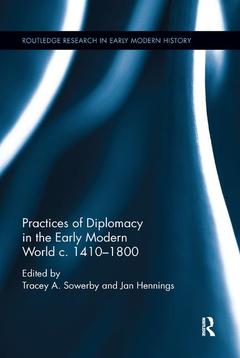Practices of Diplomacy in the Early Modern World c.1410-1800 Routledge Research in Early Modern History Series
Coordonnateurs : Sowerby Tracey A., Hennings Jan

Practices of Diplomacy in the Early Modern World offers a new contribution to the ongoing reassessment of early modern international relations and diplomatic history. Divided into three parts, it provides an examination of diplomatic culture from the Renaissance into the eighteenth century and presents the development of diplomatic practices as more complex, multifarious and globally interconnected than the traditional state-focussed, national paradigm allows.
The volume addresses three central and intertwined themes within early modern diplomacy: who and what could claim diplomatic agency and in what circumstances; the social and cultural contexts in which diplomacy was practised; and the role of material culture in diplomatic exchange. Together the chapters provide a broad geographical and chronological presentation of the development of diplomatic practices and, through a strong focus on the processes and significance of cultural exchanges between polities, demonstrate how it was possible for diplomats to negotiate the cultural codes of the courts to which they were sent.
This exciting collection brings together new and established scholars of diplomacy from different academic traditions. It will be essential reading for all students of diplomatic history.
Introduction: Practices of Diplomacy. Jan Hennings and Tracey A. Sowerby
Part 1 Status and Sovereignty Beyond the State
1. Burgundian Clients in the South-Western Holy Roman Empire, 1410-1477: Between International Diplomacy and Regional Political Culture. Duncan Hardy
2. Transylvanian Envoys at Buda: Provinces and Tributaries in Ottoman International Society. Gábor Kármán
3. The City whose "ships sail on every wind": Representations of Diplomacy in the Literature of Early Modern Ragusa (Dubrovnik). Lovro Kunčević
4. Staged Sovereignty or Aristocratic Values? Diplomatic Ceremonial at the Westphalian Peace Negotiations (1643-1648). Niels F. May
Part 2 Familiarity, Entertainment, and the Roles of Diplomatic Actors
5. Wondrous Welcome: Materiality and the Senses in Diplomatic Hospitality in Sixteenth-century Genoa. Giulia Galastro
6. Sincerity, Sterility, Scandal: Eroticizing Diplomacy in Early Seventeenth-century Opera Librettos at the French Embassy in Rome. Katharina N. Piechocki
7. ‘Minister-like Cleverness, Understanding and Influence on Affairs’: Ambassadresses in Everyday Business and Courtly Ceremonies at the Turn of the Eighteenth Century. Florian Kühnel
8. The Merchant-Diplomat in Comparative Perspective: Embassies to the Court of Aurangzeb, 1660-1666. Guido van Meersbergen
9. Trans-imperial Familiarity: Ottoman Ambassadors in Eighteenth-Century Vienna. David Do Paço
Part 3 Objects and Beasts
10. Presenting Noble Beasts: Gifts of Animals in Tudor and Stuart Diplomacy. Felicity Heal
11. Gift Exchange, Self-representation, and the Political Use of Objects During Ferdinand the Catholic’s Reign. Germán Gamero Igea
12. Merchant-Kings and Lords of the World: Diplomatic Gift-exchange between the Dutch East India Company and the Safavid and Mughal Empires in the Seventeenth Century. Frank Birkenholz
13. The Failed Gift: Ceremony and Gift-giving in Anglo-Russian Relations, 1660-1664. Jan Hennings
Afterword: From Social Status to Sovereignty—Practices of Foreign Relations from the Renaissance to the Sattelzeit. Christian Windler
Tracey A. Sowerby is currently a Senior Fellow at the Institute for Advanced Studies at the Central European University, Budapest. She is the author of Renaissance and reform in Tudor England: the careers of Sir Richard Morison (c.1513–1556) (2010) and was PI on the AHRC funded project ‘Textual ambassadors: cultures of diplomacy and literary writing in the early modern world’. Her forthcoming publications include The Tudor diplomatic corps and Tudor diplomatic culture.
Jan Hennings is Assistant Professor of History at Central European University, Budapest. His publications include Russia and Courtly Europe: Ritual and the Culture of Diplomacy, 1648–1725 (2016).
Date de parution : 12-2019
15.6x23.4 cm
Date de parution : 05-2017
15.6x23.4 cm
Thème de Practices of Diplomacy in the Early Modern World c.1410-1800 :
Mots-clés :
Van Adrichem; Barbara Stollberg Rilinger; Holy Roman Empire; Abraham De Wicquefort; Materiality; Early Modern Diplomacy; the Senses; Diplomatic Gifts; Rome; Ceremonial Treatment; Merchant-diplomat; Early Modern; Cross-Cultural Diplomacy; Peter Von Hagenbach; Ottoman; Ottoman Diplomatic; Animals; Diplomatic Ceremonies; gifts; Ottoman Dignitaries; Dutch East India Company; Lady Montagu; russia; Diplomatic Hospitality; Jan Hennings; Resident Diplomacy; Duncan Hardy; Voc Official; Vice Versa; Lovro Kunvić; Muslim World; Niels F; May; Early Modern Courts; Giulia Galastro; Boris Godunov; Katharina N; Piechocki; Florian Kühnel; Ceremonial Audience; Guido van Meersbergen; Frederick III; David Do Paço; Abba II; Felicity Heal; Transylvanian Princes; GermGamero Igea; Henri III; Frank Birkenholz; Christian Windler



